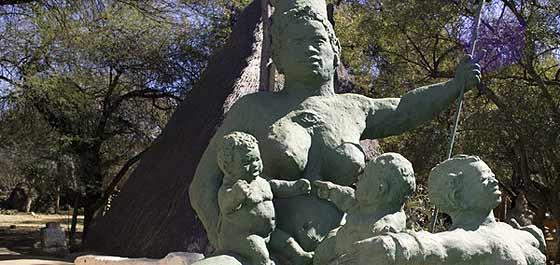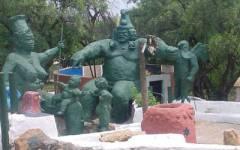Posted on July 26, 2011

Sculpture in the Credo Mutwa Cultural Village, Soweto. Photo credit: www.joburg.org.za
The last week of July signifies the end of winter in the Southern Hemisphere. It is during this time that farmers, and other people in agriculture start planning their planting season in preparation for the first spring rains in August. This cycle of nature precedes calendars and formalized agriculture, it is simply the way nature works.
It is under the same context that a group of women in Newcastle, KwaZulu-Natal come together to prepare the feast of Unomkhubulwane, who is the goddess of fertility and agriculture in the world of traditional cosmology. It was through the inspiration of a dream vision received by Thoko Hadebe, the founder of the group, that the women started coming together around this time each year.
Although the practice is becoming common in many areas in KwaZulu-Natal, with the most well known festivity taking place in Nongoma, Unomkhubulwane is a marginalized activity. The obvious reason for the marginalization of the practice is colonialism/apartheid and its outright intolerance of anything resembling African spiritual-cultural practices. This is despite the fact that there is much evidence of similar festivities taking place in other parts of the world, including Europe! In Germanic territories, for example, there is a celebration of the spring equinox, called Ostara, who is the goddess of spring, planting and a new crop season in their cosmological world. Similarly, in the Celtic world there is the festival of Beltaine, and in Native American culture there is the Iroquois midwinter festivity, all of which celebrate more or less the same occasion. Why then do we marginalize Unomkhubulwane?
Well, you see, Unomkhubulwane represents a reality of the past ('the traditional'), the past which we love speaking about and making as if we know a lot about it. But when it comes to action, we approach tradition with much uncertainty. Our degree of uncertainty is determined by the tension between our desire to re-live the past, as if we were there, and the burden of accommodating our new sets of beliefs imposed by our liberal-global order. The result of this tension is that we become unable to act, and we make up for our inability to act by excessively talking about it (traditional).
The liberal-global world imposes on us that things should be validated against empirical evidence. Without this empirical evidence arguments do not hold water in the court of law, for example. The mere fact that Unomkhubulwane comes to us in one person's dream revelation makes it unsayable in our liberal-global discourse.
To even propose Unomkhubulwane as a celebration of national significance seems bizarre in this line of thinking.It is much easier to suggest the death of a political individual as a national event, precisely because no one can deny that that person has died, and he (as it's mostly men) died for a just cause.

What Credo Mutwa has done here was to trust what is revealed to him, as an individual, and say that it can be valued publicly, without feeling that by doing so he is necessarily imposing on others.
Unomkhubulwane celebrations provide an opportunity for us to reconstitute our national celebrations, not only from the limited viewpoint of the struggle against apartheid, but from a traditional and cosmological lens; that radically alters our perception of history and significance.
Thokozani Mhlambi is an Archival Platform correspondent